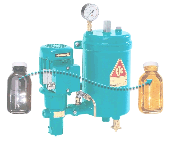
External Links
Customer Services


Information
Klassen Advanced Filtration Inc. © 2022
KLASSEN ADVANCED FILTRATION INC. -

Frequently Asked Questions
Cum copiosae invenire ex, eam te omnis choro forensibus. Nostrum antiopam pertinacia ut nam, et eum nisl nusquam. No sumo elaboraret has, ut per solum ludus aeterno, enim deleniti offendit vis ex. Sit no dicam sapientem democritum. Per temporibus signiferumque ut, etiam splendide appellantur at nec, ei pri prompta molestiae.
Why offline filtration?
Most oil systems already have a filter, so why add another? There are many reasons why an inline filter alone is not adequate, but ultimately it's because an inline filter has to strike a compromise between cleanliness and flow. For an inline filter, flow always takes the priority, which comes at the expense of filtration. An offline filter is different because its sole purpose is to clean the oil, so it can take a no-compromise approach.
What ratings do CJC filters have?
All CJC filter inserts are rated at a 3 micron absolute, and 0.8 micron nominal. That means 98.7% of particles greater than 3 micron, and 50% of particles greater than 0.8 micron are removed in a single pass. You'll see many filter tagged with a BETA value, but we find a BETA value has no practical relevance in the real world, much in the same way megapixels alone will not tell you if a camera takes good photos or not. It's easy to achieve a high BETA value when the oil is very dirty (as the ISO 16889 stipulates), but it gets more and more difficult to remove particles as the oil gets cleaner. Eventually at some level of cleanliness, every filter will reach a BETAx = 1, which means dirt in equals dirt out. CJC filters outperform competitors and ultimately the BETA test itself by continuing to clean oil in the real-world when the others give up.
Do CJC filters remove additives?
It's a long standing myth that filtering too long or too fine will damage the oil by stripping out the additives. This is simply not true. Additives that have been properly blended are in solution in the oil, much like sugar in coffee, and cannot be removed by filtration. One exception is spent additives. Since additives are designed to attack contaminants, such additives that have attached themselves to a particle will be removed with the particle in a filter, but at that point the additive is no longer useful anyway. Any additive that is not useful can itself then be considered a contaminant. We have tested and observed oils which have been filtered for thousands of hours with no change to additive levels.
Do CJC filters remove water?
All standard CJC filter inserts remove water, but some types absorb it as dP increases whereas some types promote coalescing with no change to dP. Contact us for help choosing the correct filter insert for your application.
How long do CJC filter inserts last?
While impossible to predict with certainty, in most cases a properly sized CJC unit will require a filter change once per year. Variables include component age and wear, operating temperature, sources of ingression, and how well the oil is sealed off from the environment. CJC Filter Inserts utilize a dense cellulose media structure that offers incredible surface area with a massive holding capacity. CJC Filter Inserts can hold 10 to 20 times as much contaminantion as comparably sized conventional filter cartridges.


